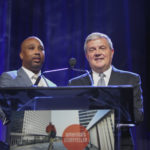By JOANN LUBLIN
Back to School — For Career AdviceEvanston, Ill. Maura J. Murrihy received outplacement assistance after a Hinsdale, Ill., bank laid her off late last year. The senior portfolio manager was surprised when the outplacement firm suggested that she also seek help from her alma mater, the Kellogg School of Management, located on Northwestern University’s bucolic campus here. The 1981 M.B.A. graduate learned she could choose one of its five alumni career coaches to give her unlimited, free advice. Ms. Murrihy worked for three months with a Kellogg coach, and ultimately landed a job with a Chicago investment consultancy. The coach “added an important layer of accountability to my job search,” she says of her demanding counselor. “When you’re 51 years old, you need all the help you can get.”
Not-so-recent college graduates are demanding more career assistance from their former schools as they face tougher employment markets. “This spring, I personally received more calls and emails from alums seeking job-hunting help than at any time in the past four years,” says Aspasia Apostolakis Miller, an official of the Northwestern Alumni Association. U.S. universities have begun to respond by creating job-search programs. Nearly 20% now offer full-fledged efforts for alumni, up from just 5% five years ago, according to alumni-service specialists interviewed. And business schools in particular are stepping up aid for their graduates. Matthew Temple, Kellogg’s director of alumni career services, says he and fellow coaches handled 2,160 appointments with M.B.A. graduates during the eight months ended on April 30 — 45% more than the year-earlier period. At the Marshall School of Business, University of Southern California, an associate director of its career-resource center counsels between 75 and 100 alumni per month, reports Peter Giulioni, head of the center. Little Help for Some Fields Alumni in many fields still get minimal help from their alma maters. Even at Northwestern, just one career counselor is available for personalized advice for the roughly 130,000 graduates who didn’t attend a professional school there. “I am not sure it is enough,” concedes Lonnie Dunlap, the university’s head of career services. But she cites several other avenues, including peer networks, job postings and alumni association workshops. Medicine, nursing, law and journalism schools in particular “are very, very weak in the area of alumni career services,” says David Mezzapelle, founder of GoliathJobs.com, a free online employment service for alumni and students that lets employers list vacancies on college Web sites. Such schools “should put more weight, budget and attention into career-service departments” that serve current students and older alumni, suggests one frustrated graduate of the Boston College School of Law. The school says it urges alums to use Symplicity, a professional job-posting service. But “employers looking for middle- and upper-level personnel do not post on Symplicity” — or they prefer Boston-area prospects, complains the 52-year-old attorney, who lives in the San Francisco Bay area. Innovative Approaches If you want better career support from your alma mater, exactly what types of services should you demand? A look at several universities with innovative approaches offers clues. Kellogg’s counseling sessions focus on self-assessments, resume and cover-letter critiques, plus mock interviews. Coaches also help their alumni assemble lists of potential employers and will assist with salary negotiations for the successful. Coach Ann Browning, of Roswell, Ga., advised Ms. Murrihy by phone during her months-long job hunt. Ms. Browning required progress reports every two weeks. “She was a great nudge,” Ms. Murrihy recalls. Kellogg is one of 22 business schools — up from eight a year ago — that encourage their alumni to contribute résumés to a pool posted at MBA Focus, an online clearinghouse that recruiters can peruse. About 14,000 résumés have been submitted since the site opened its student database to alumni in 2003. GoliathJobs.com verifies applicants’ academic credentials and counts more than 3,100 participating institutions, ranging from trade schools to universities. Kellogg also is intensifying its courtship of businesses that have a record of recruiting fresh M.B.A.s for entry-level spots. Roxanne Hori, director of the school’s career-management center, recently visited 28 corporate employers in New York and San Francisco. She proposed ways to post higher-level openings “and get Kellogg alums to respond.” Different Tactics Other universities use different tactics to connect their alumni with hiring managers. The Marshall School at USC offers to connect graduates with high-caliber executive recruiters. When alumni inquire, school officials supply the names of nearly 60 recruiters whom they investigated and identified as star players, Mr. Giulioni says. At the University of Connecticut’s School of Business, officials have scheduled a big networking event for later this month, co-sponsored by Lee Hecht Harrison, an outplacement firm in Woodcliff Lake, N.J. It has invited a dozen employers to meet its jobless alumni and other job seekers. The school has found that its older graduates without work often have difficulty navigating the vast array of employment Web sites, says Jud Saviskas, executive director for career services at UConn’s business school. To ease confusion, he compiled a list of what he considers the 10 best sites, which he will post electronically for his alumni. He tends to choose sites that are specific to certain fields, such as the site for the Society for Human Resource Management. Those sites “have jobs more relevant to an individual alum’s search,” he says. Alumni, Recruiter Matches In his prior job as the alumni career-services professional for Fairfield University in Connecticut, Mr. Saviskas found recruiters willing to match job-hunting alumni with recruiters who graduated from there, too. He also created an online community where nearly 1,700 Fairfield graduates volunteered to give their peers informal career advice and networking contacts. Some have landed jobs as a result, says Janet Canepa, the university’s director of alumni relations. Several retired Fairfield graduates want to go further and launch a formal mentoring program so they can coach fellow alumni. Ms. Canepa plans to begin tapping their extensive experience after she chooses a replacement for Mr. Saviskas, who left in January. Alumni mentors are just one item on her long shopping list of additional career assistance for Fairfield grads. After all, Ms. Canepa points out, “an employed alum is a happy alum.”
|
||
|











